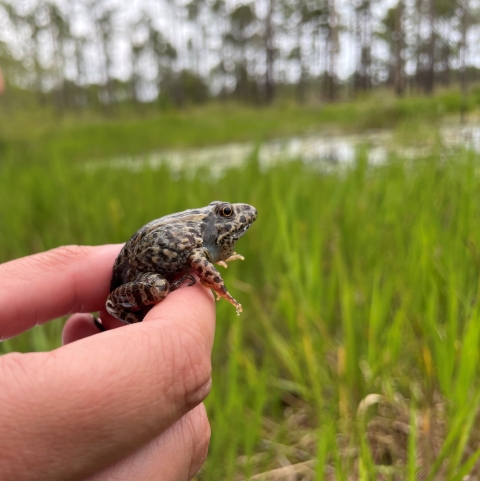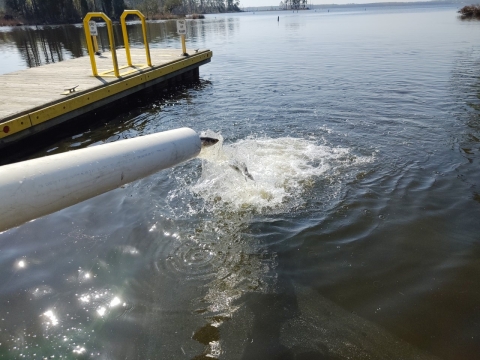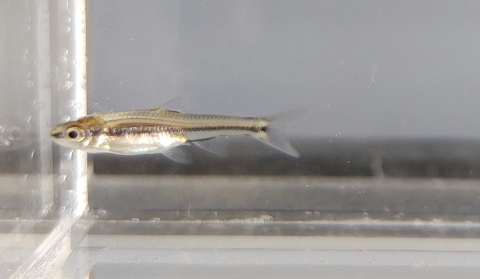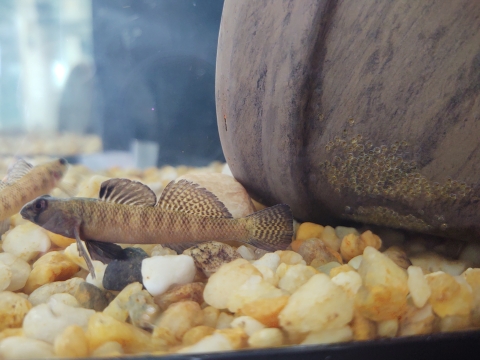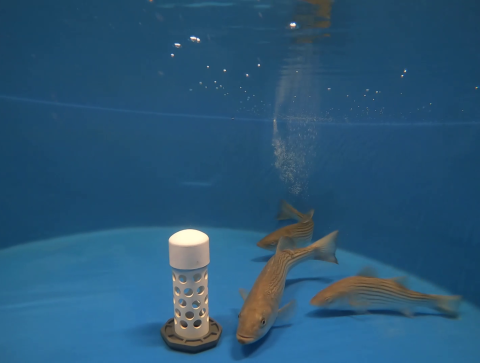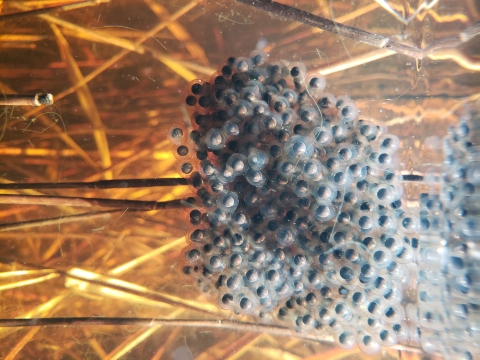What We Do
We contribute to the conservation of fish and other aquatic animals by raising them at the hatchery and releasing them into public waters. In order to raise the fish, we learn about their natural history, including habitat, diet, and water quality requirements. We work to provide all of their requirements at each of their life stages. Depending on the fish/aquatic animal program, much of our time is spent feeding, observing our animals, and if applicable, cleaning raceways or tanks. However, we spend a significant amount of time is spent making sure we have good water quality. Meeting the water quality requirements is essential for raising most species.
Management and Conservation
Staff from Edenton National Fish Hatchery have spawned and raised Atlantic striped bass for release into local waters around the time of the Wright brothers’ first flight. In the early years, the hatchery released millions of larval fish. As hatchery staff improved production methods, they have been able to stock older fish. Research has shown that older, larger fish tend to survive better. In the last 6 years, the hatchery staff have released a total of over 1 million 6-8 month old fish, the most for that size/age of any Atlantic Striped Bass Hatchery in the US. Anglers have caught our hatchery’s striped bass from Cape Hatteras, North Carolina to Maine.
In recent years, another focus of the hatchery has been restoration programs. Since 2014, the hatchery has released over 30 thousand lake sturgeon into the Tennessee River or its tributaries (including the French Broad River in western North Carolina) as part of a multiagency restoration program. In support of endangered freshwater mussels, the hatchery has successfully cultured a host fish, the white shiner. In addition, the hatchery has begun efforts to rear endangered Cape Fear shiners. Our newest program is head starting gopher frogs.
Our Services
Atlantic Striped Bass:
According to the National Oceanic and Atmospheric Administration, Striped bass harvest, by weight, was the largest of all recreationally targeted species in the nation. However, in 2019, a new benchmark assessment found the stock to be overfished and experiencing overfishing. Edenton National Fish Hatchery annually contributes hundreds of thousands of juvenile fish to the Neuse and Tar Rivers in North Carolina to help sustain their populations.
Lake Sturgeon:
Although this species not listed as federally endangered, lake sturgeon are listed as a threatened or endangered species in 19 of the 20 states it inhabits. In North Carolina, they are listed as a species of Special Concern. They were believed to be extirpated (completely fished out) from North Carolina in the mid-20th century. As part of a multi-agency restoration effort for the Tennessee River and its tributaries, Edenton National Fish Hatchery and Table Rock State Fish Hatchery began stocking the French Broad River to reintroduce this fish to North Carolina for the first time in roughly 50 years.
Cape Fear Shiner:
The federal government and the state of North Carolina classify this species as endangered. These fish are native to Cape Fear River Basin in the Piedmont of North Carolina. Edenton National Fish Hatchery, the Raleigh Endangered Species Office, and the state of North Carolina are working to propagate and release these fish into areas of the Cape Fear River Basin where there numbers are extremely low or where they no longer exist.
| Image Details
Johnny Darter:
At the request of the North Carolina Wildlife Resource Commission (NCWRC), Edenton National Fish Hatchery began a pilot program to raise Johnny Darters. Johnny Darters are a host fish for the endangered dwarf wedgemussel. When the mussels are young, they must attach to a fish host to grow and mature. Edenton National Fish Hatchery's goal is to produce enough healthy Johnny darters to serve as hosts to NCWRC and other natural resource partners in support of threatened or endangered mussel restoration programs.
Our Projects and Research
Atlantic Striped Bass:
In a cooperative effort, the state of North Carolina and Edenton National Fish Hatchery have a genetic monitoring program for striped bass released from the hatchery. When the broodstock broodstock
The reproductively mature adults in a population that breed (or spawn) and produce more individuals (offspring or progeny).
Learn more about broodstock (future parents) arrive at the hatchery, staff collect a small piece of fin from each adult fish. Once broodstock have spawned, our staff collect their eggs, raise juvenile fish to size, and release them into the North Carolina Rivers from which their parents were collected. Scientists specializing in genetic testing analyze the fin samples. When striped bass are caught as part of their monitoring program, the state of North Carolina biologists can determine whether the fish had parents who spawned at Edenton National Fish Hatchery. This information is important to determine the hatchery’s contribution of striped bass caught in the ocean and/or the rivers in North Carolina.
Lake Sturgeon:
Fish biologists at Edenton National Fish Hatchery are studying options for food items for lake sturgeon raised at our hatchery. In the years past, our staff have fed the lake sturgeon a diet consisting mostly of frozen midge (an insect) larvae imported from China. Currently, we are conducting trials other food items such as a sturgeon diet imported from Europe.
Cape Fear Shiner:
The Raleigh Endangered Species Field Office, the state of North Carolina, and Edenton National Fish Hatchery are combining efforts to restore the endangered Cape Fear shiner. These fish only exist in the piedmont of North Carolina (nowhere else in the world!). With initial help from Conservation Fisheries International, hatchery staff will continue refine techniques to spawn and grow these fish in captivity to bolster the numbers of fish in the wild.
White Shiner:
In another cooperative effort, the Raleigh Endangered Species Field Office, the state of North Carolina, and Edenton National Fish Hatchery are working to support endangered mussels and the hatcheries that grow them. An important step in growing mussels is matching the mussels with a compatible fish species. Without this step, the larval mussels cannot grow and mature. Edenton National Fish Hatchery was the first known to produce white shiners in a captive setting. Our hatchery provides reliable and healthy host fish for our mussel restoration partners.
Gopher Frogs:
Gopher Frogs are listed by the state of North Carolina as endangered and they are under consideration for federal listing under the Endangered Species Act. Only 7 of 23 historical populations of gopher frogs have been documented in North Carolina. One such population is in the Croatan National Forest. Today, there are only an estimated 70 breeding adults left. Edenton National Fish Hatchery have teamed up with the NC Wildlife Resources Commission (NCWRC), North Carolina State University's Center for Marine Technology (CMAST), and the US Forest Service to boost numbers of gopher frogs in Croatan National Forest.

